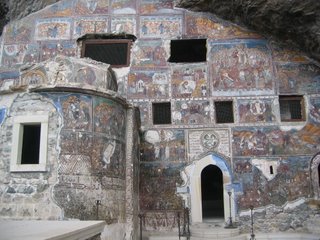Trabzon and Erzurum

Trabzon and Erzurum are in Turkey’s Northeast. The former city is lush with vegetation, perches on the Black Sea, and is only a few hours from the Georgian border. Because of this proximity, there are many immigrants from former Soviet countries, and some of the shop signs are in Russian. “Natashas,” the euphemistic name for prostitutes in Turkey, derives from the common female name in many former Soviet countries. Many natashas set up shop in Trabzon, becoming the catalysts for divorce, a source of sexually transmitted infections, and often the mothers of secret second-families for area men.

Over the mountains from Trabzon, Erzurum is isolated on a high, dry plateau. The university is the life-blood of the town; most of the town grew during the past 50 years, when the university was founded. It is a conservative city, but the student population provides contrast because many students come from other cities and towns in Turkey. While there is not a lot to do there, there is a fantastic hole-in-the-wall burger joint that was playing hip-hop videos while I enjoyed the closest thing to a cheeseburger I’ve tasted in awhile. It was a new kind of culture shock, leaving that restaurant and walking onto the dusty streets of Erzurum, where women walked, swathed in black robes.
The following are several points that caught my attention.
1) Over coffee with several female students at Trabzon’s university, one of my American Fulbright friends asked where a woman goes if she is raped or the victim of domestic violence. “She can go to Purple Roof,” an organization in Turkey that provides haven for women, they said. “Really?” replied my friend with curiosity; “there’s a Purple Roof in Trabzon?” “No,” answered the students, “there’s one in Istanbul.” Istanbul is at least a thousand miles from Trabzon. “Can she go to the police?” we asked. “She can go,” they said, “but the police will say ‘it is not my problem.’”

2) Apparently another problem in Turkey is that of other countries stirring up ethnic divisions in the unified Turkish identity. “Some of the people, other countries, they don’t want to see a very powerful Turkey,”
 said one student, so they stir up divisions between Left and Right, and between ethnic groups. “They want Turkish people to fight against each other. They want them to say ‘we are not brothers.’” This theme of foreign countries “mixing” in the politics of Turkey came up several times. Some of the allegedly guilty countries? Syria, Germany, the US, and Israel. Compounding the problem of divisions within the country is the lack of common identity that many students see. This was a new theme in these cities: the anxiety over maintaining a common Turkish identity.
said one student, so they stir up divisions between Left and Right, and between ethnic groups. “They want Turkish people to fight against each other. They want them to say ‘we are not brothers.’” This theme of foreign countries “mixing” in the politics of Turkey came up several times. Some of the allegedly guilty countries? Syria, Germany, the US, and Israel. Compounding the problem of divisions within the country is the lack of common identity that many students see. This was a new theme in these cities: the anxiety over maintaining a common Turkish identity.3) While many students hope to one-day study abroad in Europe and the U.S., there is a strong strain of anti-American Policy-ism in several of the students that I interviewed.
 “America hasn’t signed the
“America hasn’t signed the Kyoto Agreement, it is America that causes war and famine in the world, also America that pollutes the world the most,” said one passionate student studying for his PhD in education. One student mentioned the “bullshit of George W. Bush” as a problem with democratic systems. In response to the question “what are you most concerned about for the future?” several students have said “the United States.”
 4) “Global climate change.” “Finding renewable energy sources.” “The environment.” All of these answers were in response to “what are you concerned about for the future?” No one in the previous three-dozen interviews mentioned the environment as a concern, but thousands of miles from Euro-centered Istanbul, many students are giving serious thought to the causes and consequences of climate change. I have yet to learn why I stumbled across the anomaly, as the students giving these answers were in different departments at different universities. I find it both intriguing and encouraging.
4) “Global climate change.” “Finding renewable energy sources.” “The environment.” All of these answers were in response to “what are you concerned about for the future?” No one in the previous three-dozen interviews mentioned the environment as a concern, but thousands of miles from Euro-centered Istanbul, many students are giving serious thought to the causes and consequences of climate change. I have yet to learn why I stumbled across the anomaly, as the students giving these answers were in different departments at different universities. I find it both intriguing and encouraging.

1 Comments:
What happened? Armanians decided to kill the Kurds in the area, and the turkish authority took them away. About the Greeks? It is the same thing happened to Turks in Greece. Another question pops to my head, how did all those cultures managed to live together for 400 years, preserving their identity and churches and mosques,but then for some reason suddenly decided to kill each other?
Post a Comment
<< Home